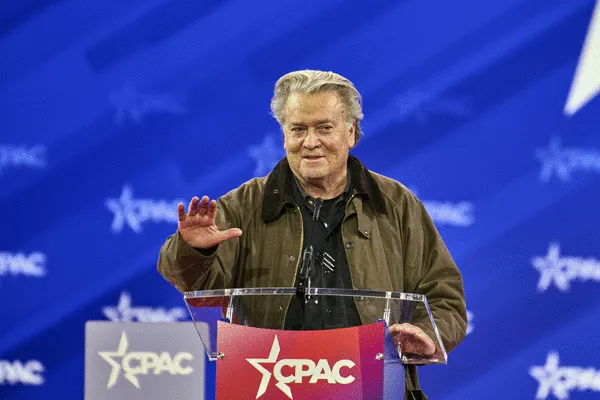WASHINGTON -- Steve Bannon asked the Supreme Court to overturn his contempt of Congress conviction for refusing to testify before the House select panel investigating the Jan. 6, 2021, attack on the Capitol, his attorneys said Friday.
In a petition, Bannon's attorneys urge the justices to decide two issues that he has pressed in his defense -- whether the government must prove a defendant knew his conduct was unlawful and the whether the composition of the Jan. 6 panel affected its authority to issue subpoenas.
Convictions for contempt of Congress are rare, and a case about it at the Supreme Court is even rarer. If the justices agreed to hear the case and decided those issues, it could shape how much sway Congress has over witnesses who defy subpoenas.
In the petition Bannon's attorneys said they filed with the court, they seek a review of a lower-court decision that found the law only requires prosecutors to show that a defendant "intentionally" chose not to fully comply with a congressional subpoena and the reasons do not matter.
The filing argues that, although he did not respond to the subpoena or produce any of the requested documents, he should not have to face contempt because he "relied in good faith" on his attorney's advice that he did not have to testify.
It also states that although he had not been a White House aide for years, the subpoena could involve executive privilege of President Donald Trump during his first term.
The Justice Department at trial and on appeal argued that President Joe Biden had not invoked executive privilege over Bannon's testimony and that Bannon could not ignore the subpoena as he had.
Bannon, an influential conservative activist, served as CEO of Trump's election campaign in 2016 before serving as a senior counselor at the White House for several months. Bannon left government service in 2017.
The House Jan. 6 panel subpoenaed Bannon for testimony and documents about the actions he took in the days and months leading up to the attack. Although Bannon never testified, the committee used video clips and other records showing that Bannon said Trump intended to declare himself the winner regardless of the result on election night.
The House voted to hold Bannon in contempt and referred him to the Justice Department. Bannon was convicted on two charges of contempt of Congress in 2022 after a brief jury trial, and a three-judge panel of the District of Columbia Circuit unanimously upheld the conviction.
The judges there held that Bannon could not ignore the subpoena or rely on the defense that he listened to attorney advice because that would mean every potential witness could do that and avoid testifying. The panel also held that Bannon's testimony was "not even arguably subject to executive privilege" because he was a private citizen.
Later the full D.C. Circuit declined to review that panel decision over the dissents of Judge Karen LeCraft Henderson and Trump appointees Judges Gregory Katsas, Neomi Rao and Justin Walker. Those judges raised issues with a prior decision by the D.C. Circuit which they felt bound the hands of the court and ran counter to how the Supreme Court ruled in most criminal cases.
Rao and Henderson also argued the case "threatens the separation of powers" by imposing criminal consequences on former executive branch officials for refusing to testify to Congress.
Bannon also argues the Jan. 6 committee "did not follow the rules imposed by the House Resolution creating the committee -- and thus the subpoena was not lawfully issued."
The only other recent contempt of Congress case also emerged from the House Jan. 6 select panel. Trump administration trade adviser Peter Navarro refused to testify or provide documents to the panel and was also convicted on two counts of contempt of Congress.
Navarro appealed his conviction to the D.C. Circuit; however, the Trump administration has declined to defend it and the case has not been scheduled for argument.
The case is Stephen K. Bannon v. United States.
